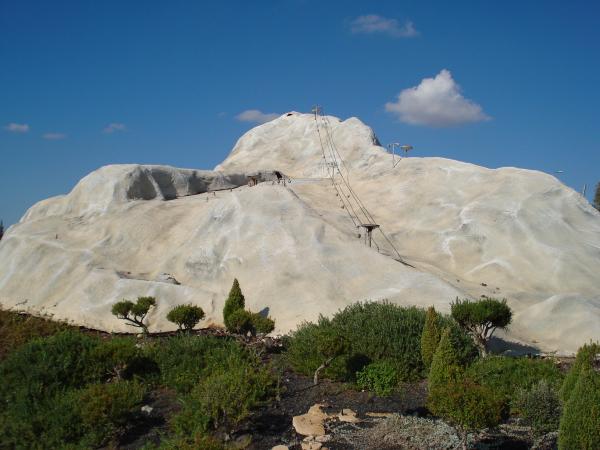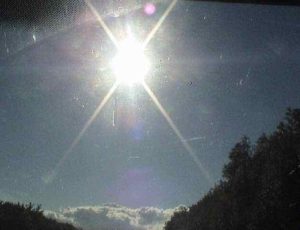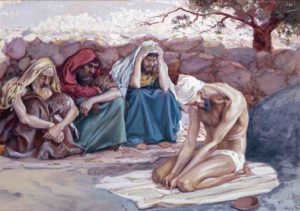Psalm 133
Brothers who live together in Unity
How good and pleasant it is when brothers live together in unity! It is like precious oil poured on the head, running down on the beard, running down on Aaron’s beard, down upon the collar of his robes. It is as if the dew of Hermon were falling on Mount Zion. For there the Lord bestows his blessing, even life for evermore.
It’s a tiny psalm, set to music and sung with enthusiasm for worship and gatherings, especially v. 1, because at first reading the following two verses may seem a bit odd : it is a hymn to brotherly love, then we can ask what it has to do with Aaron’s beard, soaked with oil dripping on his clothes and with Mount Hermon that surely few people will know. These somewhat unexpected images have to say something about the « brotherly fellowship » .The verses 2 and 3 each begin with “It’s like” ; they explain what it meant to David, the author, about the “sweetness” or “delight” to be or to live together in unity.
1. The text: Song of ascents or degrees (Ps.120-134)
To ascend to Jerusalem in procession or hymns sung on the steps of the Temple?
They become part of the ritual of the pilgrim who arrives at the Temple.
A. The brothers
Who are these brothers together? In the Old Testament the word brother referred to a)children from the same parents (Genesis 4.8), also to the half-brother or the half-sister (Gn 20:16;. 37.4)
b) to members of the same family ( cousin, nephew, eg Abraham and Lot, etc.).
c) to members of the same tribe (Gn 31.32) or to the same people (Exodus 2.11; Leviticus 25.25; Numeri 25.18; Romans 9.3).
The word « brother » means also a close friend (David and Jonathan, 2 Samuel 1:26) an ally (phrase of respect, Num 20.14) or one’s neighbor. (Num 15.12)
The concept of brotherhood focuses always on solidarity and mutual responsibility. No one has the right to say as Cain. “Am I my brother’s keeper ?” (Gn 4.9)
The brothers are the members of God’s people
The Hebrew people is a large family of brothers. In this psalm, we can understand that the brothers referred to are the members of the Hebrew people gathered for one of the three great feasts called “pilgrimage”-feasts to the temple of Jerusalem. They are meeting with the inhabitants of Jerusalem for a large celebration. These brothers are gathering, seating, living together, they stay together. How beautiful ! All quarrels and differences are forgotten.
What is the meaning of the oil?
What relationship is there between the oil poured on the head and on the beard of Aaron, the fringes of the mantle and the dew of a mountain flowing onto another. What does that mean?
That reminds of the anointing oil that the kings, prophets and priests received. This anointing is the first sign of the presence of God for whoever gets it. It is also the sign of a mission entrusted to them by God in the world. The presence of God in his love and service to others are associated. Thus the right relationship to God is to receive a lot from him, and to give many to the others.
In Hebrew the person who received this oil was called the “Messiah“, which was translated into Greek by “Christos“. (“Christ” is not Jesus’ last name nor a reserved title.) It refers to the person who is recognized as having a special authority from the fact that he had the presence of God on him, to reign, or to prophesy. This symbol of the oil to represent the presence of God was not random, simply think about all the uses of oil in the Mediterranean civilization:
• Oil is one of the basic elements of food, cakes are made with olive oil and flour (eg. in the story of Elijah and the widow of Zarephath).
• Oil was also used to power lights, so it is a source of light (this oil as fuel is found in a symbolic meaning in a parable of Jesus).
• The oil was also used to heal wounds and to relieve pain, as an ointment. The Good Samaritan poured oil and wine on the wounds of the injured.
The oil is thus an image of what God gives us with his presence in us
• As our body needs to be fed, our spiritual life is fed by the Spirit that God communicates to us, that is how our spiritual life will develop.
• “Man shall not live by bread alone, but by every word that proceeds from the mouth of God” (Matthew 4: 4), and we know that it is Jesus Christ who is our “bread of life “.
• The Word of God enlightens us, it gives meaning to our lives, it dispels our fears as a lamp helps us in the night, and again, for us it is Jesus Christ who is “the light of the world”.
• And finally, God’s presence is a balm in our heart giving us comfort and softness.
Psalm 133 goes a long way, telling us that all this is also to be found in the brotherly relationship with the others. The brotherly union is a source of light, food and energy in our lives. When we live this way it is as if God himself came to renew our lives. It is in the mutual love with each other that we receive God’s gifts, his blessing, his life, his Spirit, his Word. By opening ourselves up to others, we also open ourselves up to God. In the same way, Christ will summarize all the law in all circumstances by “Love thy neighbor as thyself“, which is similar to this other command “You shall love God with all your heart… »
– The head and the beard
This oil of blessing, this “good oil” trickles, says the Psalm, from the head to the beard. In Hebrew the word « head » also means the beginning or youth. And the word « beard » also means the old age. We can say that it is a whole life that is illuminated by brotherly love and God’s blessing. That is life for each of us, from our birth until our death that God nourishes, enlightens and heals in the union of those who know how to live as brothers. We can live and benefit at any age, from the smallest child to the most advanced old age, that is where lies the secret of the universal good, happiness, blessings and Eternity.
– Aaron’s beard
Looking more closely at the text, we realize that there are actually two beards, and the second one is the beard of Aaron. Aaron was the brother and spokesman of Moses, the high priest of Israel, he is in himself the symbol of the relationship with God … and the word “beard” also means in Hebrew power or authority. What is at stake is the strength of our relationship with God. And the strength of our relationship with God is irrigated, fed, lit, enhanced by the precious balm of brotherly love. Love is what renews, brightens a lifetime, even in our spiritual or religious life. Without love, our religious life would be deprived of light, food and energy (cf. 1 Corinthians 13).
– The edge of the garment – The tzitzits
Then, says the text, the oil runs down to the “edge of the garment” of Aaron. This is a reference to the ritual fringes that Jews were to sew on the edge of their clothes, called tzitzits
Numbers 15: 38-40
Speak to the Israelites and say to them : Throughout the generations to come you are to make tassels on the corners of your garments, with a blue cord on each tassel. You will have these tassels to look at and so you will remember all the commands of the LORD, that you may obey them and not prostitute yourselves by going after the lusts of your own hearts and eyes. Then you will remember and obey all my commands and will be consecrated to your God.
The fringes are there to remind the believer of God’s commandments which he must obey. What is at stake here is obedience to the will of God, faithfulness to God. We see that this obedience to a rule is not what comes first for the psalmist, but it comes after the personal relationship to God, after the faith of the heart. Anyway, obedience to the commandments ultimately boils down to this one commandement – and this is the message of the Gospel: love your neighbor. Living united with our brother, is what gives fullness to our whole life, to our relationship with God and to our obedience to His Word.
– The dew of Hermon coming down. 2nd picture
After the oil there is the dew that describes brotherly love. In the semi-desert countries the dew is a source of life. When the prophets dream of the messianic time, there is always plenty of water, rivers, torrents of water. In times of drought, the morning dew allows plants to survivre. What is surprising here is that this dew comes from Mount Hermon, that is to say from a mountain which is 2800 m. high and often covered with snow. The Jordan River has its source there : the water from Mount Hermon irrigates all of Palestine. Mt Hermon is located on the northern border of Israel with Lebanon, with sometimes little brotherly neighbors. Or it is from there, says the Psalm, that true blessing can come. The water runs down from Mt Hermon to flow over the mountains of Zion – that is Jerusalem in the south of Palestine. Our faith can live only because we are in relationship with the outside, we accept to dialogue with others, with those who are not our brothers or our fellowmen. If we withdraw into ourselves, we die. We need to open ourselves, to live united with our brothers, of course, but also to welcome the others and even our enemy. Mount Zion is the place of the temple of Jerusalem, the symbol of God’s dwelling. Now it is true that our faith is always likely to dry out. It needs a source of living water to stay as a green and fertile garden, and not to become an arid, barren desert. Thus, water as well as oil is an image of the presence of God. This source of life and freshness ultimately comes from the conscience that we are living united as brothers. This is what can irrigate our own relationship with God, our faith.
In this Psalm, several literary devices show that the experience of brothers in verse 1 and the blessing in verse 3 are closely linked together. We can read these two parallel lines as echoing one to another. The unity of the brothers refers to the grace of life for ever. The emphasis on the “descent” of the symbols highlights that the unity of the brothers in the blessing of life forever, always comes from above. It is a grace, not a right.
This downward movement leads to the conclusion. What unites these brothers is a common blessing. They are brothers, at first because they are beneficiaries of the same heritage: life forever. The pleasure reserved for them is not only about the fact that they are brothers or brothers together, but that they are united in worship of the merciful Lord who gave them life forever. It is the collective worship of the Lord, source of life, which is “so good and so pleasant”. This salvation, this life is a gift, a blessing in the heart of the covenant between God and his people. Both comparisons, anointing oil and dew, point to the blessing of God, each is a symbol of that grace of God. There happens the fullness of relationship to God, in brotherly love and in opening ourselves to those who are less close to us, and it is here that the blessing of God “runs down” on us and even that life flows “down” to us from Mt Hermon, from the outside. And there, yes, there is the blessing and Eternal Life.
Conclusion
The real unity of the brothers is only possible thanks to the blessing of eternal life in Jesus Christ. Eternal life is in him. He said : “I am the resurrection and the life. “(John 11:25). It is given rather than made. This is more than a skilful trick or a human achievement. Despite different backgrounds and traditions within the Church, whoever believes in Christ has eternal life (Jn 3:15). The person who believes in Christ is in him and is in brotherly relationships with all who are in Christ. This unity in Christ is already established. It exists. It is up to us to nourish and to safeguard it. Jesus in his priestly prayer, prays for those who believe in him by the word of the apostles: “I live in them and you live in me. May they be brought to complete unity …”(Jn 5:23 p.m.) Paul, in his letter to the Ephesians says,” Make every effort to keep the unity that gives the Holy Spirit through the bond of peace. “(4: 3) Later in the same chapter, he speaks of our growth in Christ and of the building up of the whole body,” until we all reach unity in the faith and in the knowledge of the Son of God “(v. 13). The same apostle exhorts us: “and over all these virtues put on love, which binds them all together in perfect unity.”(Col 3:14)
Brotherly fellowship does not work by chance, it is fertilized and stimulated by oil and dew, two images of the presence of God among us. Let us keep these images to search and make live again and again the fellowship which the Word is offering us!
How good and pleasant it is when brothers live together in unity!…
For there the Lord bestows his blessing, even life for evermore.
L. N.



